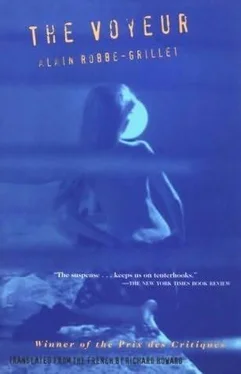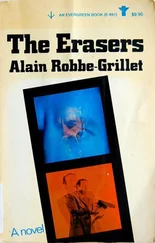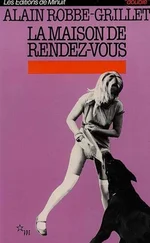Mathias had then followed him to his cottage, situated just beyond the village in a little cove near the sea. They had begun dinner at once, exchanging old recollections and discussing the changes that had occurred in the countryside since those days. Afterward, the salesman had shown them his line of watches, but without delaying long, for he had to continue his rounds according to the established schedule in order to be back at the harbor before the boat left—at four-fifteen.
First he had finished the systematic canvassing of the village at Black Rocks, where he had managed to sell several more watches—including three to a single family, the one that ran the grocery-general store. He had also found the two fishermen he had met an hour before, at the café. One of them had bought a watch.
Once beyond the village, the road followed the coast east, but at a certain distance from the cliff, across a moor as barren of bushes as of houses. The ocean, because of the rolling ground, remained generally invisible. Mathias pedaled rapidly, impelled rather than impeded by the wind. The sky was quite overcast. It was neither cold nor hot.
The road, narrower and less well-kept than that leading from town to the lighthouse, was nevertheless satisfactorily paved—broad enough, in any case, for a bicycle. In this almost deserted section of the island—and off the main arteries—there was probably never much traffic. The road made a large semicircular curve which reached the farthest point of the island and then curved back toward the center. It was on this last portion, extending from the seaboard villages to the southwest section of town, that he might meet a cart or an old automobile. But on the less-frequented part, toward the tip of the island, the traffic was so rare that patches of low vegetation had invaded the sides of the road in some places, while the wind, at others, accumulated little beaches of dust and sand in which the bicycle left its tracks. Crushed into the surface of the road—no toad, no frog.
No streak of shadow could be seen lying across the road, since there was neither telegraph pole nor sunshine. Having already crossed the narrow passageway between the dried corpse and the rounded extremity of the pole, old Madame Marek would have continued on her way without seeing him.
The salesman, at the last moment, had had to call out to her in order to be recognized. After having inquired why he had found the farm deserted and locked, he turned to the object of his visit: the sale of wrist watches. There, at the roadside, he had gained his first success on the island.
He tried to calculate from memory the total amount received since he had landed. First of all there was old Madame Marek: one hundred fifty-five crowns; next, the exhausted-looking couple: one hundred fifty-five crowns, making three hundred ten; then the proprietress of the café: two hundred seventy-five—and three hundred ten: five hundred eighty five… five hundred eighty-five… five hunched eighty-five…. The next transaction had not been a sale but a gift: he had made a present of a gold-plated lady’s watch to the girl… or young woman…
As a matter of fact there had been a third person at lunch at Jean Robin’s. It was to her that Mathias had shown his collection, since the sailor was obviously uninterested., (Standing in front of the little window, he was looking outside.) The salesman had set down his suitcase at the end of the long table—pressing the clasp, folding back the cover, moving aside the memorandum book…—the girl, who was beginning to clear the table, had come closer to look.
He took the cardboard strips out of the suitcase one by one; she admired them without saying a word, opening her eyes very wide. He stepped back a little to let her examine his wares as long as she liked.
Over her shoulder, he saw her fingering a gold-plated watch strap, then the case itself, more slowly. Twice—once in one direction, then in the other—her middle finger followed the circular shape. She was slender and graceful, bending her neck at the nape—under his eyes—within reach of his hand.
Leaning over a little, he says: “Which do you like best?”
Still without answering, without turning around, she picks up the cardboard strips one by one. Exposed by the rounded collar of her dress, a long scratch studded with red pearls tears across the tender skin of her neck. Mathias imperceptibly stretches out his hand.
He checks the gesture at once. The arm falls back. He has not tried to stretch out his hand. Slender and graceful, the young woman bends her head a little lower, exposing the nape of her neck and the long scratch at its base. The tiny pearls of blood seem to be still wet.
“This one is the prettiest.”
After the story about Violet, the fisherman had again begun on some general considerations of life on the island—oddly contradictory though they were. Each time that he seemed to want to illustrate what he was saying by some more personal detail, the latter contradicted the very point of view he was defending. In spite of this, the general tone of his remarks retained—in appearance, at least—a coherent structure, so that a distracted attention would not realize the anomalies involved.
It was to have a pretext for leaving the table—the first step toward departure—that Mathias had proposed showing the watches. He could not delay any longer, for he had to finish his rounds and return to the harbor before four-fifteen.
Suitcase, clasp, cover, black memorandum book…
Having glanced distractedly at the first cardboard strip, the fisherman turned his back to look out the window. His companion, on the contrary, came closer to look. It occurred to Mathias that he might thank her for her hospitality by making her a present of one of the cheaper watches, which at her age would still make her happy.
Afterward, he returned to the village, which he quickly finished canvassing. He managed to sell several more watches—including three to a single family, the one that ran the grocery-general store.
After Black Rocks, the road ran east along the coast, but at a certain distance from the cliff, and turned inland after the fork leading to the nearby point—where there was no house to interest the salesman—toward the seaboard villages extending to the southwest section of town. Mathias, who was riding very fast, hurrying because of the lateness of the hour, soon found himself among the first houses. He managed to make a good many sales without wasting too much time, as many in the little clusters of houses as in the isolated cottages that marked the intervals between them. Encouraged by his success, he even made excursions off the main road (venturing farther inland again), returning to the coast at an important fishing village—the last before the big pier, the harbor dominated by its ruined fortifications, the flat housefronts along the quay, the landing slip, and the little steamer which was doubtless already preparing for departure.
But the salesman did not take advantage of the short cut which would have brought him directly to the harbor. His watch indicated barely three o’clock, and according to his schedule he still had to explore the whole northwest section of the island—that is, the wild and sparsely settled west coast to the left of the lighthouse, then the steep peninsula called “Horses Point,” symmetrical to the one he was now heading for, and finally the villages—or rather the groups of farmhouses—scattered between the point and the fort, located inland for the most part, so that he would not even try the least accessible ones if his time was running short.
For the moment he had more than an hour ahead of him, and if he hurried he could make up for his delay without difficulty. He therefore returned to the main road and kept to his prescribed course.
Читать дальше












